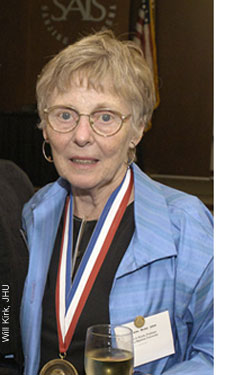![[Chesapeake Quarterly masthead]](/images/uploads/siteimages/imported/masthead.gif)
![[Chesapeake Quarterly masthead]](/images/uploads/siteimages/imported/masthead.gif) |
|
2004
|
Volume 3, Number 1
|
Table of Contents
|
Subscribe
|
Download pdf
|
|
|
|
Brush Receives Mathias Medal
Grace Brush, a scientist well known for her work on the pre-Colonial ecology of the Chesapeake Bay, has won the prestigious Mathias Medal in recognition of scientific excellence. William R. Brody, President of the Johns Hopkins University, presented the award to Brush on May 6, 2004 at a well-attended ceremony in Washington, D.C. 
Named for former Maryland Senator Charles "Mac" Mathias - who is widely credited with launching a federal-state partnership to restore the Bay - the Mathias Medal recognizes scientists whose work has had a significant impact on policies affecting the Chesapeake. Awarded by the Sea Grant programs of Maryland and Virginia and the Chesapeake Research Consortium, the Medal has been given only four times since its creation in 1990. A professor in the Whiting School of Engineering, Department of Geography and Environmental Engineering at the Johns Hopkins University, Brush is the first paleoecologist to win the award. She is also the first woman. Brush pioneered studies that use the presence of plant pollen, microscopic organisms and other substances in Bay sediments to track changes in the estuary and in the watershed that surrounds it. Her studies have provided the basis for much of our understanding of how and when the forests surrounding the Bay were first cleared, and how resultant shifts in sediment loads and water chemistry changed the Bay and its ecosystem. "When policymakers attempt to compare the Bay of the past with the Bay of the future," says Maryland Sea Grant director, Jonathan G. Kramer, "they turn to the work of Grace Brush." Kramer calls her work "pivotal," because it has detailed the story of the Bay's response to human settlement, beginning with the clearing of the region's forests and continuing right up to the impacts of sewage treatment plants. "Grace Brush has been extremely helpful in identifying the impacts of land use changes on the Bay," says Ann Swanson, Executive Director of the Chesapeake Bay Commission. "Her work is very concrete. It's added to the quiver of facts you need to hit the target [of nutrient reduction]." "There are many scientists working on the Bay, but only a few who really influence you," says Swanson. "Grace Brush is one of those few." Ted Poehler, Vice Provost for Research at the Johns Hopkins University, calls Brush a "cornerstone" of her department. "Grace has a long and impressive history at Hopkins," he says. "She helped others and helped to bring stability to that program and to [the study of] the Chesapeake Bay." Poehler points out that Grace has set an important example for women in science. "Back in 1956, when she got her doctorate, the number of women in engineering fields was quite small. The women who did enter the sciences were more likely to enter biology or chemistry." Researchers like Brush were really "pioneers," he says. "It was pretty lonely." Adds Poehler, "We need more role models like Grace." |
|
|
Top of Page |
|
|
Home |
Contents |
Other Issues |
|
|
|
||||
![[Maryland Sea Grant]](/images/uploads/siteimages/imported/h_footer_mdsg.gif) ![[NOAA]](/images/uploads/siteimages/imported/h_footer_noaa.gif) |
This page was last modified June 07, 2004 |